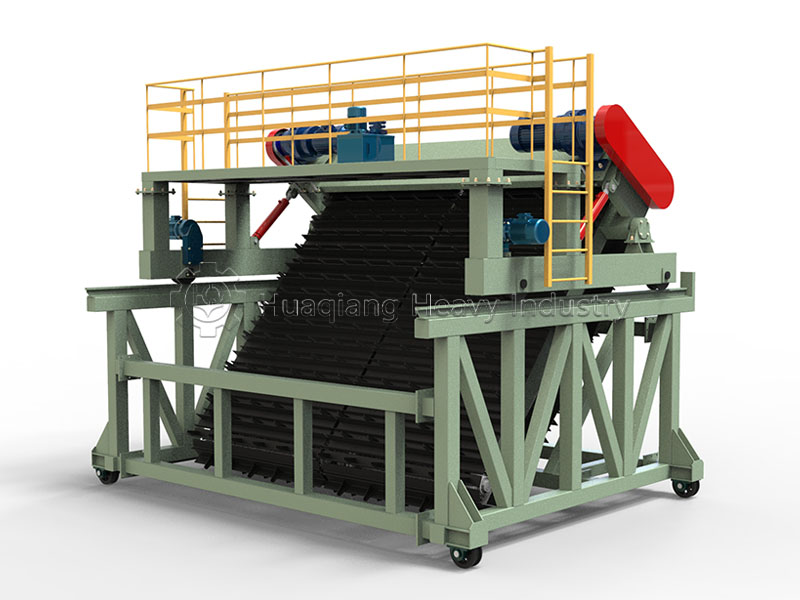Equipment Overview
The chain-type compost turner, as a key piece of equipment in modern compost production, is specifically designed for large-scale aerobic composting processes. Through precise movement on fermentation tank tracks, this equipment achieves efficient turning of organic waste, transforming livestock manure, municipal sludge, agricultural straw, and other organic waste materials into high-quality organic fertilizer.
Compared to traditional turning equipment, chain-type compost turners offer significant advantages including greater working depth, uniform turning, and higher automation levels, making them indispensable core equipment for modern organic fertilizer production enterprises.
Working Principle Details
Track Movement System
The equipment operates smoothly along preset tracks on both sides of the fermentation tank, covering the entire tank length and achieving continuous, uninterrupted turning operations. This design ensures equipment stability and operational continuity.
Deep Turning Mechanism
Chain-driven turning plates grab materials from the tank bottom, thoroughly breaking up and scattering the materials to the top of the pile during the lifting process. This process not only achieves uniform mixing of materials but, more importantly, provides sufficient oxygen for composting.
Forced Aeration Function
During the turning process, materials fully contact air, creating an ideal growth environment for aerobic microorganisms. This forced aeration mechanism significantly accelerates organic matter decomposition and improves composting efficiency.
Depth Adjustment Capability
Advanced hydraulic lifting systems allow operators to adjust turning depth according to actual needs, with maximum working depth reaching 3 meters. This flexibility greatly improves space utilization in fermentation tanks.
Application Advantages
The application of chain-type compost turners has brought revolutionary improvements to organic waste treatment. In terms of processing efficiency, the equipment can shorten traditional composting cycles by 30%-50% while ensuring uniform maturation of materials.
The equipment exhibits excellent adaptability. Through variable frequency speed control systems, it can automatically adjust operating parameters according to different material characteristics (such as humidity, viscosity), ensuring optimal performance under various working conditions.
In terms of durability, key components are made of special wear-resistant materials, ensuring long-term stable operation in harsh working environments. Optimized structural design reduces maintenance frequency and costs, saving significant operating expenses for enterprises.
Environmental and Economic Value
Chain-type compost turners not only solve the challenge of organic waste treatment but also create significant economic benefits. By converting waste into high-value organic fertilizer, enterprises can achieve resource recycling while reducing dependence on chemical fertilizers.
The environmental contribution of this equipment is equally noteworthy. It effectively prevents environmental pollution from organic waste, reduces greenhouse gas emissions, and promotes sustainable agricultural development.
Future Prospects
With continuously increasing environmental requirements and rapid development of organic agriculture, the market demand for chain-type compost turners will continue to grow. In the future, intelligence and energy efficiency will become the main development directions, providing more efficient solutions for global organic waste treatment.
Whether for large-scale farms, organic fertilizer production plants, or municipal sludge treatment centers, chain-type compost turners will become important tools for achieving resource recycling and environmental protection, making positive contributions to promoting green agricultural development.
Organic Fertilizer Production Conclusion
The chain compost turner represents a cornerstone technology in modern organic fertilizer production, playing a vital role in the initial organic fertilizer fermentation process. This advanced fertilizer making machine exemplifies how fermentation composting technology for organic fertilizer has evolved to meet large-scale production demands. When integrated into a complete organic fertilizer production line, the chain compost turning machine works synergistically with other essential equipment to transform raw organic materials into valuable fertilizers. For operations requiring bio-enhancements, the bio organic fertilizer production line incorporates specialized equipments required for biofertilizer production alongside fermentation equipment. Following efficient decomposition facilitated by the windrow machine, materials progress to granulation stages where equipment like the drum granulator and disc granulator shape the final product. The comprehensive fertilizer production machine ecosystem also includes drying solutions such as the drum organic fertilizer dryer and alternative granulation systems like the double roller press granulator. While this discussion focuses on organic systems, it’s worth noting that parallel advancements occur in mineral fertilizer production, where the npk fertilizer production process utilizes specialized npk fertilizer production line configurations. The roller press granulator production line represents another significant innovation in fertilizer granulator technology. Through continuous improvement in compost fertilizer machine design and integration, modern fertilizer production achieves unprecedented efficiency, sustainability, and product quality, supporting global agricultural needs while promoting environmental stewardship.



